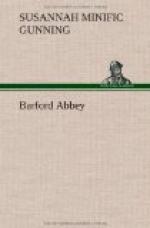I thought him mad, but kept on by the side of his horse ’till we came to the gate of a meadow, where he dismounted.
Now, Sir,’ said he, with a look that bespoke his consequence,—have patience, whilst I tie up my horse.
Patience, John! (and I swore at him) I am out of all patience.
With that he condescended to deliver your letters.—I rambled with surprise at the contents, and fell against a hedge.—John, who by this time had fasten’d his steed, came up to me just as I recover’d my legs;—and speaking close to my ear,—’Twas John Warren, Sir, was the man who found out the Lady; ’twas I was the man, Sir.
I shook him heartily by the hand, but for my soul could not utter a syllable.—I hope you are not ill, Sir, said the poor fellow, thinking me seiz’d speechless.—
No, John;—no, reply’d I; it is only excess of pleasure.—You are a welcome messenger:—you have made your fortune, John Warren, and please your honour, has made his dear Lord happy;—that is more pleasurable to him than all the riches in the world.
You are an honest, good creature, John.
Ay, Captain; but was it not very sensible to remember the young Lady’s hand-writing?—Would a powder-headed monkey have had the forecast?
Oh very sensible, John;—very sensible, indeed!—Now go the Abbey;—ask for my servant;—say you was sent by Mr. Molesworth to enquire for the family; but do not mention you have seen me:—I shall return by a different way.
John mounted immediately, and I walk’d full speed towards the house. I found Mr. Morgan taking long strides up and down the dining-parlour, puffing, blowing, and turning his wig on every side.
Where have you been, Captain? I have sent to seek you.—Lord Darcey’s servant is without;—come to enquire how things are here.—I would not let them send his message up;—but I have been out myself to ask for his Lordship.
Well, Sir, and what says the servant?
Says!—Faith I hardly know what he says—something about hopes of him:—to be plain, I should think it better if hope was out of the question.—If he and all of us were dead—But see John yourself; I will send him to you.
As he was just without the door, I drew him back,—and turn’d the key.—
Come hither, Sir;—Come hither, Mr. Morgan:—I have something of importance to communicate.
D——n ye, Captain, what’s the matter now? (staring.)—I’ll hear no more bad news:—upon my soul, I’ll run out of it (attempting to open the door).
Hold, Sir; why this impatience?—Miss Powis lives!—Will you run from me now?—Miss Powis lives!—With that he sent forth a horrid noise;—something betwixt howling and screaming.—It reach’d the dressing-room, as well it might:—had the wind sat that way, I question if the village would not have been alarm’d.—Down ran Sir James and Mr. Powis into the library;—out jump’d Mr. Morgan.—I held up my hand for him to retreat:—he disregarding the caution, I follow’d.—Sir James was inquiring of a servant whence the noise had proceeded.




